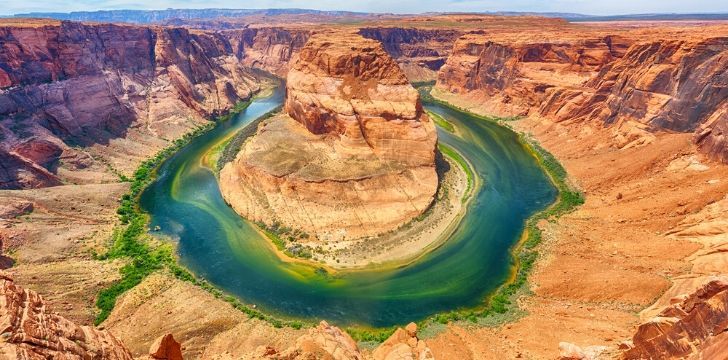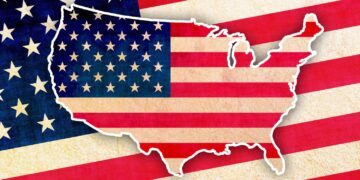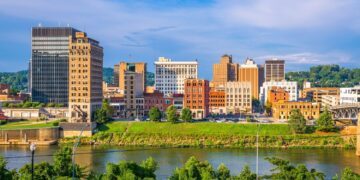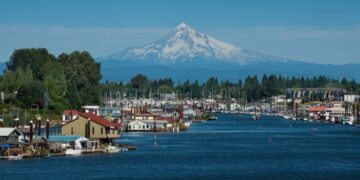Nicknamed the “Copper State” or the “Grand Canyon State, Arizona was the 48th state to join the United States of America on February 14, 1912.
It has a population of 7.2 million people, making it the 14th most populous state.
Arizona is bordered by the states of California, Colorado, Nevada, New Mexico, and Utah. With a total of 113,990 sq mi (295,234 km²) of land it is the 6th largest state.
Enough dry facts for now though, let’s take a closer look at what really makes this desert state tick!
We’re not exactly sure what Arizona was named after.
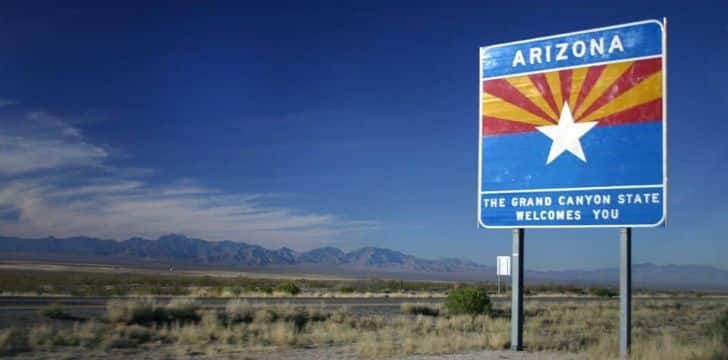
We still don’t know the exact origin of the name Arizona, and it’s quite possible we never will.
That being said, there are really only two options.
The first possible origin of the name goes back to the original inhabitants of Arizona – the indigenous O’odham people.
The legend goes that there is a small spring in northern Sonora, a state of Mexico which shares its border with Arizona.
When European settlers first arrived they asked the name of the area, and they were told the name of the spring – alĭ ṣonak.
This name then morphed through the Spanish language into Arizonac, and eventually through English into Arizona.
The other theory has a much simpler origin. There were a large number of shepherds from the Basque region of Spain in Arizona and Sonora, and it was named by them.
In Basque there is a phrase “haritz ona”, meaning “the good oak” and it’s theorized to have morphed into Arizona over time.
The first Europeans to reach Arizona were Spaniards.
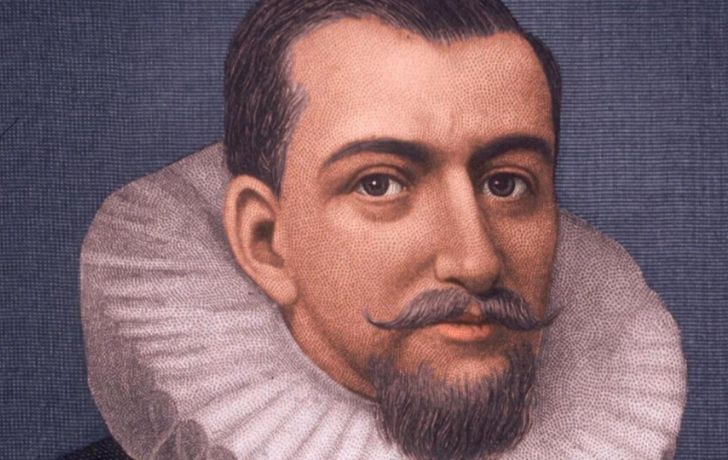
The first Europeans to cross into Arizona were with a Spanish missionary by the name of Marcos de Niza in 1539.
During his travels Marcos reportedly came upon Cibola, a great city full of untold riches.
Although he only saw it from a distance, he made a detailed report of his findings when he returned to Culiacán.
This then lead the conquistador and explorer Francisco Vázquez de Coronado to embark on a great venture across the region of Arizona, reaching into New Mexico.
Unfortunately for Coronado though, he never found the riches he sought.
One of the best-preserved meteorite craters is in Arizona.
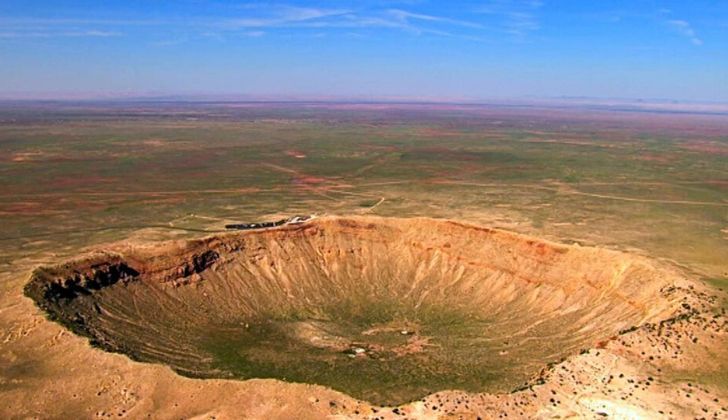
The Barringer Meteor crater (known as the “Meteor Crater”) is one of the best-kept of such sites in the whole world.
It’s estimated that the meteor struck earth around 50,000 years ago.
The crater is a mind-blowing 1 mile (1.6 km) wide, and 570 ft (170 m) deep!
Arizona was once a state of Mexico.
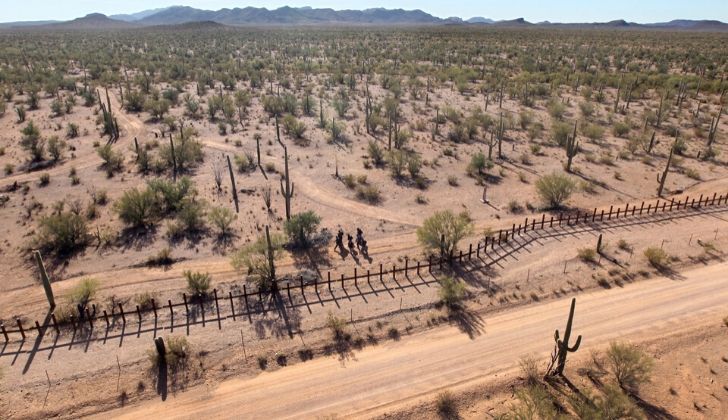
Something that comes as no small surprise given its close proximity to the US-Mexico border is the fact that Arizona was a part of Mexico before it was a US state.
The area was actually originally colonized by the Spanish, and it was only when Mexico gained its independence from Spain that it took control of the state.
That control was to be short-lived though, as the land was taken by the United States as a result of the Mexican-American war in 1848.
It then took another 64 years for the region to finally attain statehood!
The London Bridge was dismantled and moved to Arizona.
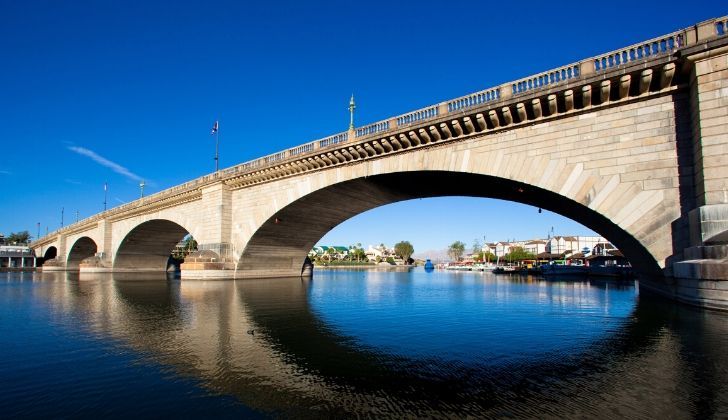
One of the more bizarre stories to come out of Arizona is the tale of Robert McCulloch Sr, who founded the city of Lake Havasu City.
The London Bridge just so happened to be sinking, and was beginning to become a safety concern at the time Robert was founding Lake Havasu City. So what did he do?
He bought the whole bridge, lamps and all – and had it shipped all the way to Arizona!
The bridge was taken apart piece by piece and then reconstructed, and to this day it’s the biggest tourist attraction in the surrounding area.
Only about 15% of land in Arizona is privately owned.
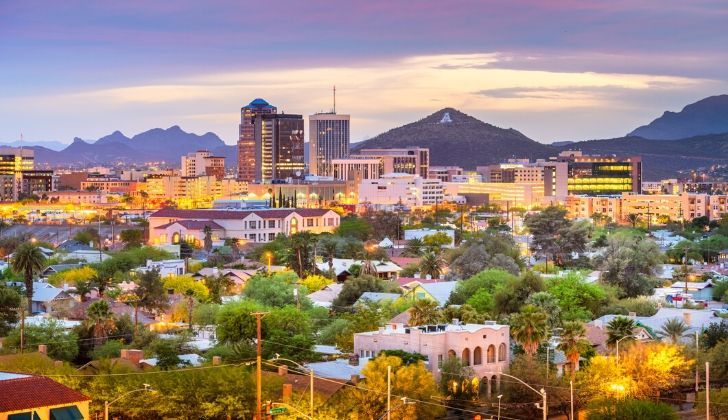
While this number may seem tiny, you have to remember that Arizona is a massive state.
15% of Arizona still makes 17,100 square miles (27,360 km²) of privately owned land!
The rest of Arizona is taken up by state/national parks, protected land, state trust land and space reserved for Native American reservations.
The Grand Canyon in Arizona is actually not the deepest in the world!
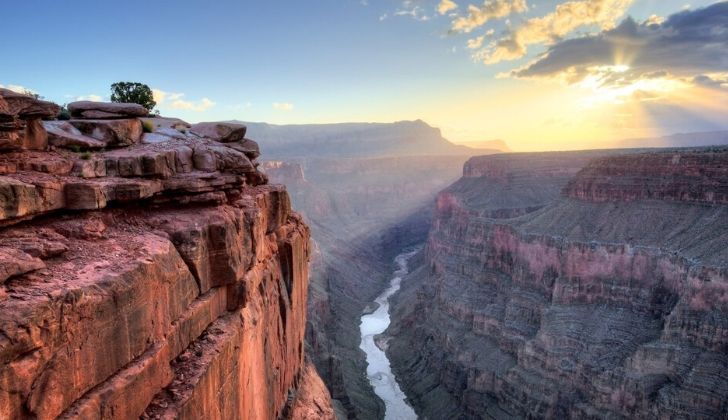
Here’s a fact that we’re sure will start some arguments wherever you share it.
Long has the Grand Canyon been publicized as the deepest canyon in the world, especially by overly proud patriots and residents of Arizona.
While the Grand Canyon is overwhelmingly deep, and mind shatteringly spectacular, it’s just not deep enough.
The Grand Canyon reaches a depth of just over a mile, 6,093 ft (1,857 m) to be precise.
That being said, it seems that nobody can really agree on what exactly is the deepest canyon in the world, as everyone has slightly different criteria.
The most likely answer, though, is the Yarlung Zangbo canyon in Tibet, which is an incredible 19,715 ft (6,009 m) deep!
Arizona has more than just the Grand Canyon.
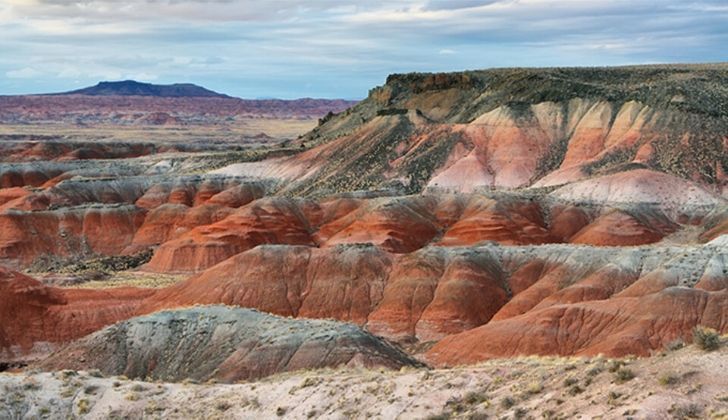
Most visitors to the state of Arizona flock to the Grand Canyon to marvel in its sheer size and beauty, but they often overlook the many other national parks and monuments the state has to offer.
The Grand Canyon is actually just one of 22 different national parks and monuments!
Some notable alternatives to the canyon are the petrified trees in the Petrified Forest National Park and the ruins of dwellings carved out into the sides a canyon at the Canyon de Chelly National Monument.
Arizona is more than deserts and mountains – it’s 27% forest!
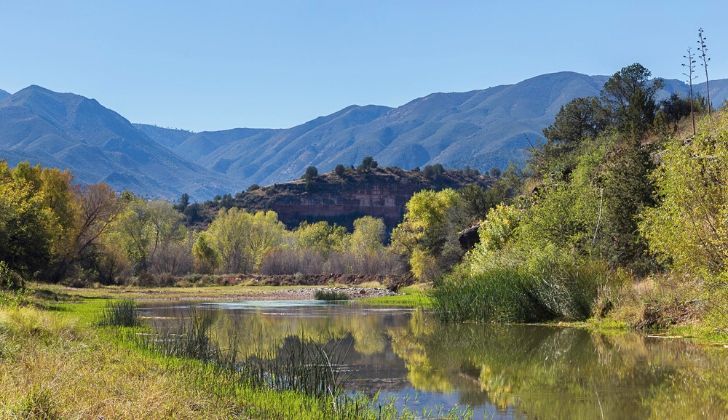
When most people think of Arizona, they think mountains, plateaus, and various other forms of arid landscape.
One of the more surprising facts about Arizona’s geology is that around 27% of its landscape is made up of forests!
To put that in perspective, France has just 2% more forest with 29% of its land being forested.
Arizona doesn’t observe daylight savings time.
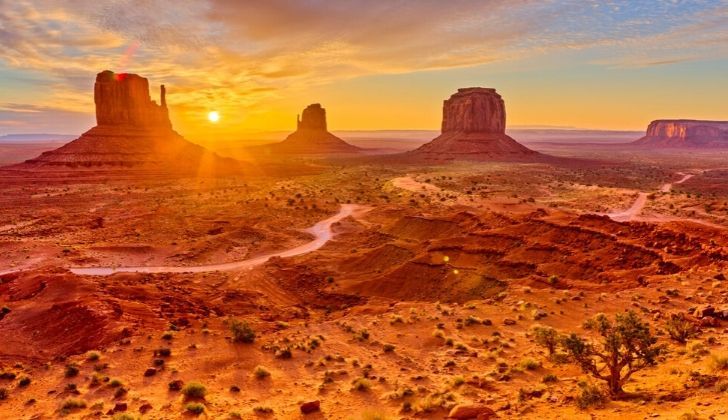
In fact, it’s one of just two states that doesn’t observe this, with the other being Hawaii.
Arizona legislators submitted a special request for an exemption, and were granted it. As a state, that is.
There is still one region of the state which follows daylight saving time – the exception is within the Navajo Nation, the largest land area in the US which was kept by indigenous peoples.
Arizona is home to 13 different species of rattlesnakes!
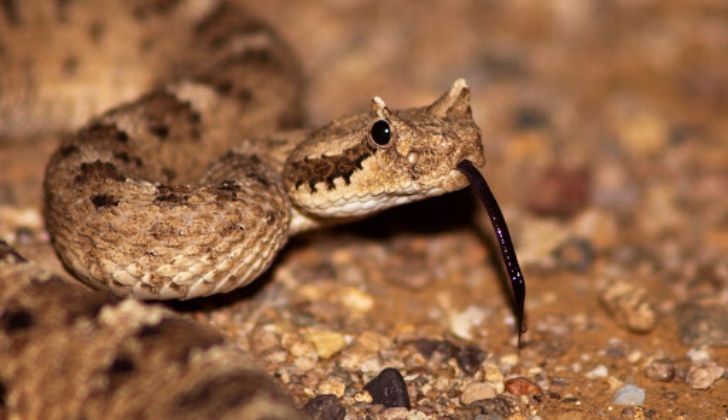
If snakes aren’t your thing, then I really wouldn’t recommend a trip out to Arizona!
Here you can find the most venomous rattlesnake in the US (Mohave Rattlesnake), the biggest rattlesnake found in the west of the US (Western Diamond-backed Rattlesnake), and even a rattlesnake with horns above its eyes (Sidewinder Rattlesnake).
The scariest part of all though isn’t getting bitten, it’s the cost of the anti-venom – Treatments can often exceed $20,000!
The very first McDonald’s drive-through was created in Arizona.
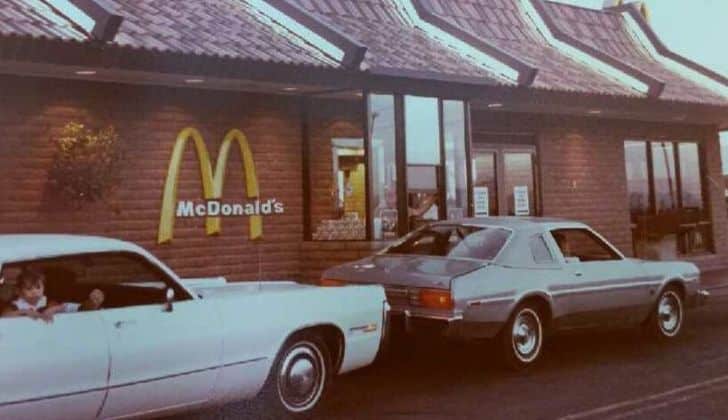
You heard that right – there actually was a time when you had to get out of your car to dine on all that McDonald’s has to offer!
Back in the fast-food dark ages this was the case, until one enterprising franchise owner in Sierra Vista had a brain wave in 1975.
It can’t all be attributed to him though, as the reason behind his decision was connected to the nearby military base, Fort Huachuca.
At the time, soldiers stationed at the base were not allowed to appear in public in their uniform.
As a result they headed in and out of the base in their uniforms, and when they drove past McDonald’s they couldn’t stop for a bite to eat.
And so it was that the world’s first McDonald’s drive-through opened on January 24, 1975, much to the joy of local soldiers and civilians alike!
Cutting down a cactus in Arizona is a class-4 felony.
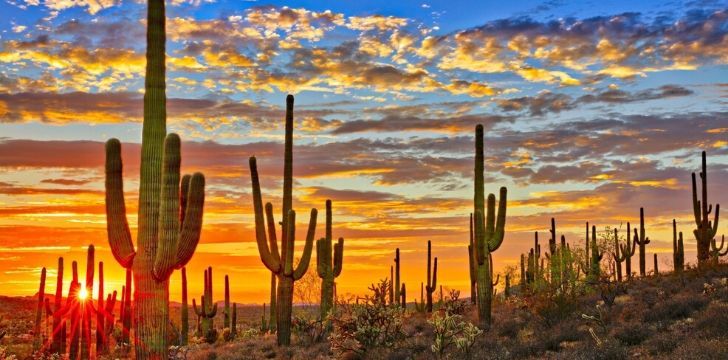
Well, not any cactus. We’re talking about the Saguaro cactus, one of the most iconic of the cactus species.
The Saguaro cactus is native to the Sonoran desert, Arizona, and can grow to a whopping 40ft (12m) tall!
These cacti can live over 150 years, but they grow incredibly slowly.
Arizona state law protects the Saguaro though, and harming them in any manner is illegal, with a possible prison sentence of 3 years!
Arizona has a monsoon season.
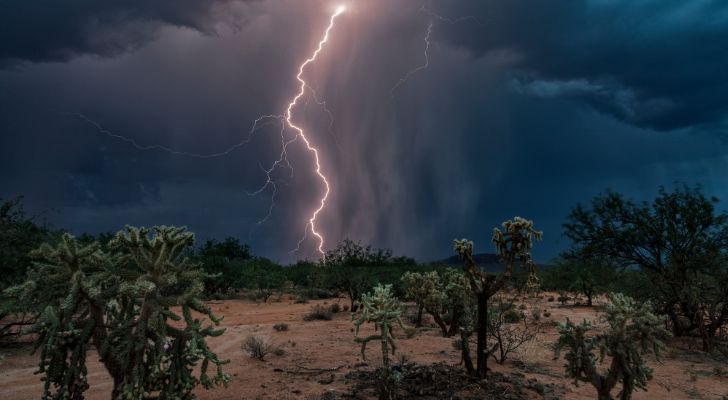
Believe it or not, but this arid state is prone to heavy rains come the end of summer.
During the monsoon season it’s common to experience thunderstorms, torrential rain, and even flash flooding!
Arizona locals are so frequently trying to cross swollen rivers and streams during flash floods that a “stupid motorist law” was passed.
This law states that anyone rescued while attempting a cross a barricaded section of flooded roadway has to pay the cost of their rescue.
Arizona’s climate tends towards the extremes.
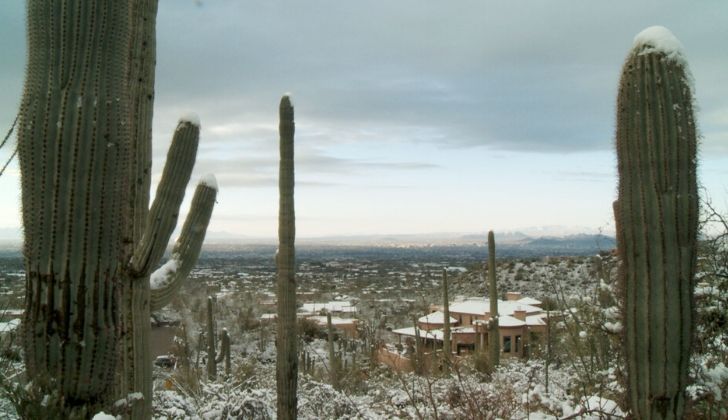
When it comes to the weather, Arizona has it all.
The city of Phoenix, Arizona, holds the record for the most days in a year over 100º F (38º C).
Flagstaff, Arizona, holds the opposite end of the record though, in the lower 48 states at least, where it has the most days below freezing.
As you can see, Arizona is more than just the state that holds the Grand Canyon.
It’s so much more than that, and is constantly able to surprise you wherever your look.
Just make sure you watch your step and keep an eye out for rattlesnakes!

